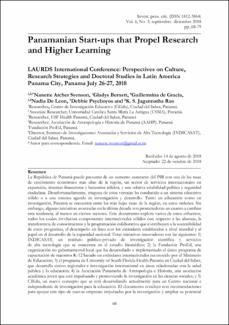Panamanian Start-ups that Propel Research and Higher Learning

View/
Date
2018-10-22Author
Psychoyos, Debbie
Rao, KS Jagannatha
Archer Svenson, Nanette
Bernett, Gladys
de Gracia, Guillermina
De Leon, Nadia
Metadata
Show full item recordAbstract
The Republic of Panama can boast of a steadily rising GDP with among the highest economic growth rates in the region, an expanding international services sector, robust financial and banking systems, and relative political stability and citizen security. Unfortunately, none of these advantages has led to strong education system or an extensive research and development agenda. In both education and research, Panama ranks among the lowest in the region. Nevertheless, certain initiatives advanced over the past decade show promise for shifting this tendency, at least in certain sectors.This paper explores several of these endeavors, all of which involve strong international components with regard to partnerships, knowledge transfers and collaborative programming that serve to contribute to these programs' sustainability, performance in line with globally established standards, and role in national capacity development. These innovative initiatives are the following: 1) INDICASAT, a public-private institute for scientific research and high technology services that concentrates on biomedical study; 2) the ProEd Foundation, a local non-governmental organization that has developed and implemented the only international standard driven K-12 teacher training program recognized by the Ministry of Education; 3) the University of South Florida Health Panama program at the City of Knowledge that develops regional courses and international research in areas related to public health and education; 4) the Panamanian Association for Anthropology and History, a young academic association that is driving and promoting research in the social sciences; and 5) CIEdu, a new concept currently being developed for a national, autonomous Center for Education Research.The paper concludes with recommendations for supporting these types of research-driven start-ups and expanding their collaborative potential. It also highlights how Panama´s City of Knowledge, an international education free-zone, is uniquely positioned to propel these higher learning initiatives for the country and the region.
